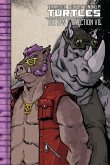Reading the poetry of Dan Gerber, we are summoned to this larger truth: Though we live in fraught times, on the tipping point of human self-destruction, we and our planet are still very much alive. In one of his last sonnets, nearly five hundred years ago, Michelangelo Buonarroti confronted the paradox of our earthly existence: “Why beauty mixed with terror, feeds so strangely my desire.” Reading The End of Michelangelo, we are similarly reminded that the very fact of being alive—experiencing our fleeting, fragile existence—is our only source of joy, our only avenue of consolation. These are poems that wake us up, revivify our desire to go on living despite our times, to counter our times; if poetry has a purpose, it may be exactly this. As T.H. White suggests, we can't save our world if we don't first savor it. “Dan Gerber tenderly reels his readers through the ‘beautiful movie’ he calls the passing of time on Earth, in a language completely unadorned and Zen-like in its quietude. The thing itself carries the weight off these poems that recall the deep imagery of Vallejo, Neruda, and Wright.” —Rain Taxi
Hinweis: Dieser Artikel kann nur an eine deutsche Lieferadresse ausgeliefert werden.
Hinweis: Dieser Artikel kann nur an eine deutsche Lieferadresse ausgeliefert werden.








